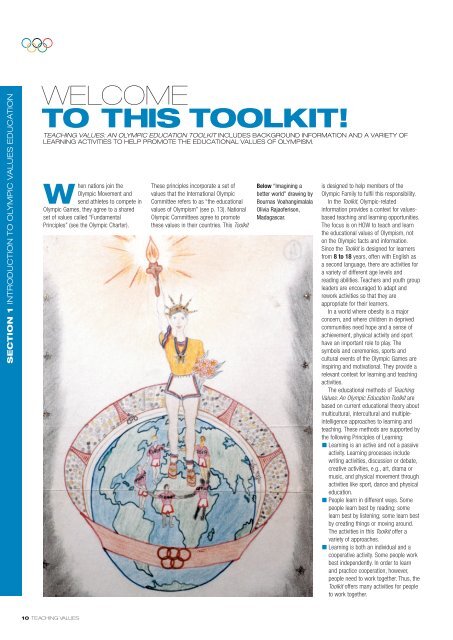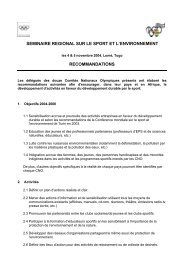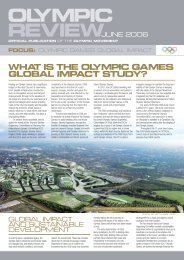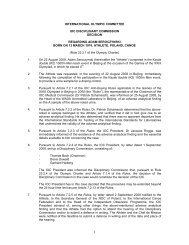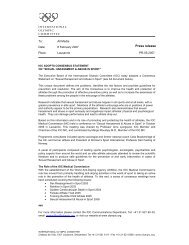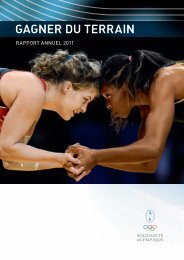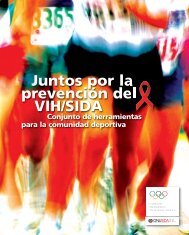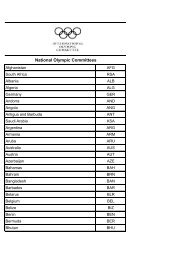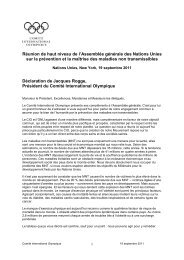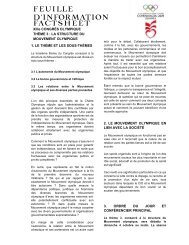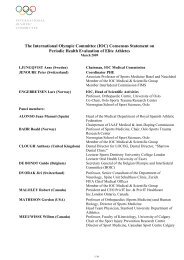Teaching Values- An Olympic Education Toolkit - International ...
Teaching Values- An Olympic Education Toolkit - International ...
Teaching Values- An Olympic Education Toolkit - International ...
You also want an ePaper? Increase the reach of your titles
YUMPU automatically turns print PDFs into web optimized ePapers that Google loves.
SECTION 1 INTRODUCTION TO OLYMPIC VALUES EDUCATION<br />
WELCOME<br />
TO THIS TOOLKIT!<br />
TEACHING VALUES: AN OLYMPIC EDUCATION TOOLKIT INCLUDES BACKGROUND INFORMATION AND A VARIETY OF<br />
LEARNING ACTIVITIES TO HELP PROMOTE THE EDUCATIONAL VALUES OF OLYMPISM.<br />
When nations join the<br />
<strong>Olympic</strong> Movement and<br />
send athletes to compete in<br />
<strong>Olympic</strong> Games, they agree to a shared<br />
set of values called “Fundamental<br />
Principles” (see the <strong>Olympic</strong> Charter).<br />
These principles incorporate a set of<br />
values that the <strong>International</strong> <strong>Olympic</strong><br />
Committee refers to as “the educational<br />
values of Olympism” (see p. 13). National<br />
<strong>Olympic</strong> Committees agree to promote<br />
these values in their countries. This <strong>Toolkit</strong><br />
Below “Imagining a<br />
better world” drawing by<br />
Bournas Voahangimalala<br />
Olivia Rajaoferison,<br />
Madagascar.<br />
is designed to help members of the<br />
<strong>Olympic</strong> Family to fulfil this responsibility.<br />
In the <strong>Toolkit</strong>, <strong>Olympic</strong>-related<br />
information provides a context for valuesbased<br />
teaching and learning opportunities.<br />
The focus is on HOW to teach and learn<br />
the educational values of Olympism, not<br />
on the <strong>Olympic</strong> facts and information.<br />
Since the <strong>Toolkit</strong> is designed for learners<br />
from 8 to 18 years, often with English as<br />
a second language, there are activities for<br />
a variety of different age levels and<br />
reading abilities. Teachers and youth group<br />
leaders are encouraged to adapt and<br />
rework activities so that they are<br />
appropriate for their learners.<br />
In a world where obesity is a major<br />
concern, and where children in deprived<br />
communities need hope and a sense of<br />
achievement, physical activity and sport<br />
have an important role to play. The<br />
symbols and ceremonies, sports and<br />
cultural events of the <strong>Olympic</strong> Games are<br />
inspiring and motivational. They provide a<br />
relevant context for learning and teaching<br />
activities.<br />
The educational methods of <strong>Teaching</strong><br />
<strong>Values</strong>: <strong>An</strong> <strong>Olympic</strong> <strong>Education</strong> <strong>Toolkit</strong> are<br />
based on current educational theory about<br />
multicultural, intercultural and multipleintelligence<br />
approaches to learning and<br />
teaching. These methods are supported by<br />
the following Principles of Learning:<br />
Learning is an active and not a passive<br />
activity. Learning processes include<br />
writing activities, discussion or debate,<br />
creative activities, e.g., art, drama or<br />
music, and physical movement through<br />
activities like sport, dance and physical<br />
education.<br />
People learn in different ways. Some<br />
people learn best by reading; some<br />
learn best by listening; some learn best<br />
by creating things or moving around.<br />
The activities in this <strong>Toolkit</strong> offer a<br />
variety of approaches.<br />
Learning is both an individual and a<br />
cooperative activity. Some people work<br />
best independently. In order to learn<br />
and practice cooperation, however,<br />
people need to work together. Thus, the<br />
<strong>Toolkit</strong> offers many activities for people<br />
to work together.<br />
10 TEACHING VALUES


